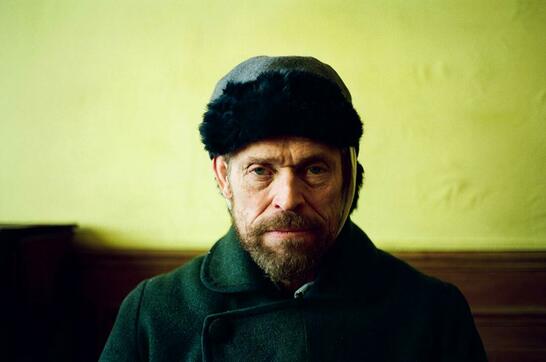AT ETERNITY'S GATE
***
Director: Julian Schnabel
Screenwriters: Julian Schnabel, Jason-Claude Carriére and Louise Kugelberg
Principal cast:
Willem Dafoe
Rupert Friend
Oscar Isaac
Mathieu Amalric
Mads Mikkelsen
Amira Casar
Country: Switzerland/Ireland/UK/France/USA
Classification: PG
Runtime: 111 mins.
Australian release date: 14 February 2019
Previewed at: Sony Pictures, Theatrette, Sydney on 24 October 2018.
In At Eternity’s Gate, set during the famous Dutch post-impressionist painter Vincent van Gogh’s final months in Arles and Auvers-sur-Oise, Julian Schnabel, an artist himself, has directed an interesting, ‘impressionistic’ portrait of a creative genius. It was during this feverish period of creativity at what was to be the end of his life that he painted 75 works in only 80 days. The artist is portrayed with great sensitivity by Willem Dafoe, who succeeds in revealing the mindset of this complicated man who created some of the most stunning paintings of the 20th Century but sold only one (The Red Vineyard) during his lifetime. Today, of course, they sell for many millions of dollars.
Using letters purportedly written by the artist himself, Schnabel doesn’t claim that At Eternity’s Gate is a definitive portrait of the artist, but rather an observation of an artist who was way ahead of his time. He says, “The van Gogh seen in the film comes directly out of my personal response to his paintings, not just what people have written about him.” His Oscar-winning co-writer, the great Jean-Claude Carriére adds, “It’s a film about a painter, van Gogh, in which we tried not to provide a biography of van Gogh - that would be absurd, it’s so well known - but to dream up scenes that might have taken place, in which van Gogh might have participated, might have taken part, in the course of which he might have spoken, but which history does not record.”
In the last years of his life the painter was under the care of a homeopathic doctor Paul Gachet (Mathieu Amalric) and also sought consolation from a priest, portrayed in the film by Mads Mikkelsen. His relationships with his fellow artists, predominately Paul Gaugin (Oscar Isaac), were integral to his sense of purpose and he considered them to be part of ‘life’s treasures’. Throughout his life, he was supported by his loyal brother Theo (Rupert Friend) and Theo’s wife Johanna (Amira Casar). After a drunken argument, with Gaugin, the fragile artist reputedly sliced off part of an ear, an act which is shrouded in debate as there are different versions as to how it actually happened. His death, too, has become shrouded in mystery. Schnabel’s film, like last year’s Loving Vincent, shows that he was shot by village boys, rather than deliberately committing suicide.
Schnabel succeeds in bringing van Gogh’s life and paintings to life by placing him and them in the magnificent locations and settings in which they were originally created and using the luminous colours of the artist’s palette. Van Gogh suffered from psychotic episodes and delusions that plagued his well-being for most of his life. He is quoted as saying, “I put my heart and soul in my work, and I have lost my mind in the process.” The vibrant colours, wildly hand-held camera-work (by the brilliant cinematographer Benoît Delhomme), extreme close-ups, blurred lower-half frames, echoes, repetitive dialogue, peculiar other-worldly music (composed by Tatiana Lisovkaia), all contribute to a sense of the cerebral chaos that the painter grappled with.
At Eternity’s Gate is an off-kilter visual experience that will remain with you after you leave the cinema and is another feather in Willem Dafoe’s cap, proving that as an actor, he is, not unlike the artist he portrays, capable of delivering something that is beyond expectation. He even learnt to paint for the film and he said that every day, out on location, they worked on the script and then improvised to determine the film’s point of view. In fact, it must be said that Dafoe is the very heart and soul of Schnabel’s film. Without him, all the cinematic tics and mannerisms used to convey van Gogh’s state of mind would quickly become grating. With him, you are drawn directly into the thoughts of the artist and given a glimpse of how different and confusing that must have been. Dafoe’s performance has earned him a nomination for Best Actor at the forthcoming Academy Awards and, interestingly, it’s the second time an actor has been nominated for playing van Gogh. The first was Kirk Douglas in Lust for Life in 1956. Douglas didn’t win and I suspect that Dafoe won’t either but, in all fairness, he probably should.
